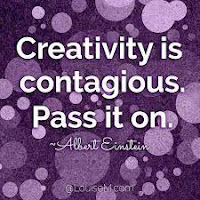In this episode, Your Creative Imagination . . .
This week I’d like to revisit a piece we posted in May 2020; it was one of our first episodes.
Let's pretend today is your birthday; you received a gift from a loved one that’s beautifully boxed; what’s your first impulse? Would you set the box aside, “I’m busy right now; I’ll get to it later.” My guess is you would enthusiastically open the box.
Let me ask you this: What if I told you you’d had the most precious gift in your possession since birth, yet you’ve never taken the time to open the box?
I’m referring to the power of your creative imagination.
Albert Einstein summarized it best, “The true sign of intelligence is not knowledge, but imagination.”
Let’s examine our daily thoughts; what do you think about it? Seriously, are your thoughts dependent on your reaction to “what’s happening right now” situations and other people? If so, that special gift we’re discussing is not being used. And if we’re not careful, our imagination can lead us to self-destructive habits.
So let’s strive for productive habits.
It’s been said the brain has four powers; think of them as switches you can turn on and off.
Switch number:
1. The power to absorb information and knowledge.
2. The power of retention.
3. The power of making judgments.
4. The ability to think creatively.
Children, artists, writers, and musicians always use this fourth switch. They do it by simply asking questions. No worries or hesitation. Just wholesome to-the-point questions. Be careful; people are swayed by the media, friends, and neighbors daily to think negative, non-productive thoughts. Here’s how to change that.
First, you must recognize that creative ideas can come from anywhere, anytime.
- Keep an idea file. Ideas in the early stages need to be nurtured; record your thoughts.
- Ideas need encouragement. Treat your thoughts as seeds; plant them, nurture them.
- Encourage creative thinking in others.
- Creative thinking is like mining for Diamonds in the wealthiest soil. You’ll get primarily small ones, but if you stay with them, you’ll find that big one you're looking for.
So what are you waiting for - turn on switch number four.
How you ask?
Spend 15 minutes a day digging in that gold mine between your ears. Take out a sheet of paper every day and write down your thoughts. Use a bound notebook to keep them together. At first, those thoughts may be off the wall, absurd ideas. That’s okay. Capture them.
I'll bet there’s a smartphone in your pocket—an electronic notebook to record audio, video, or written text of your brilliant ideas. Okay, I get it, maybe your thoughts are not so brilliant, but if you work at it every day for just 15 minutes, you will be amazed at what you come up with. Maybe it's a song, a story, a book, or maybe a podcast. Who knows. Start with something you want. This may appear selfish at first, but this will help you form the habit of digging into your mind. By mining those thoughts, you will reach your target.
Ralph Waldo Emerson said, “The mind, once stretched by a new idea, never returns to its original dimensions.”
Have fun with it; open the box. Happy Birthday! Unleash the power of your creative imagination.
Why not?
I’m Patrick Ball; thanks for listening. See you in the next episode.

Comments